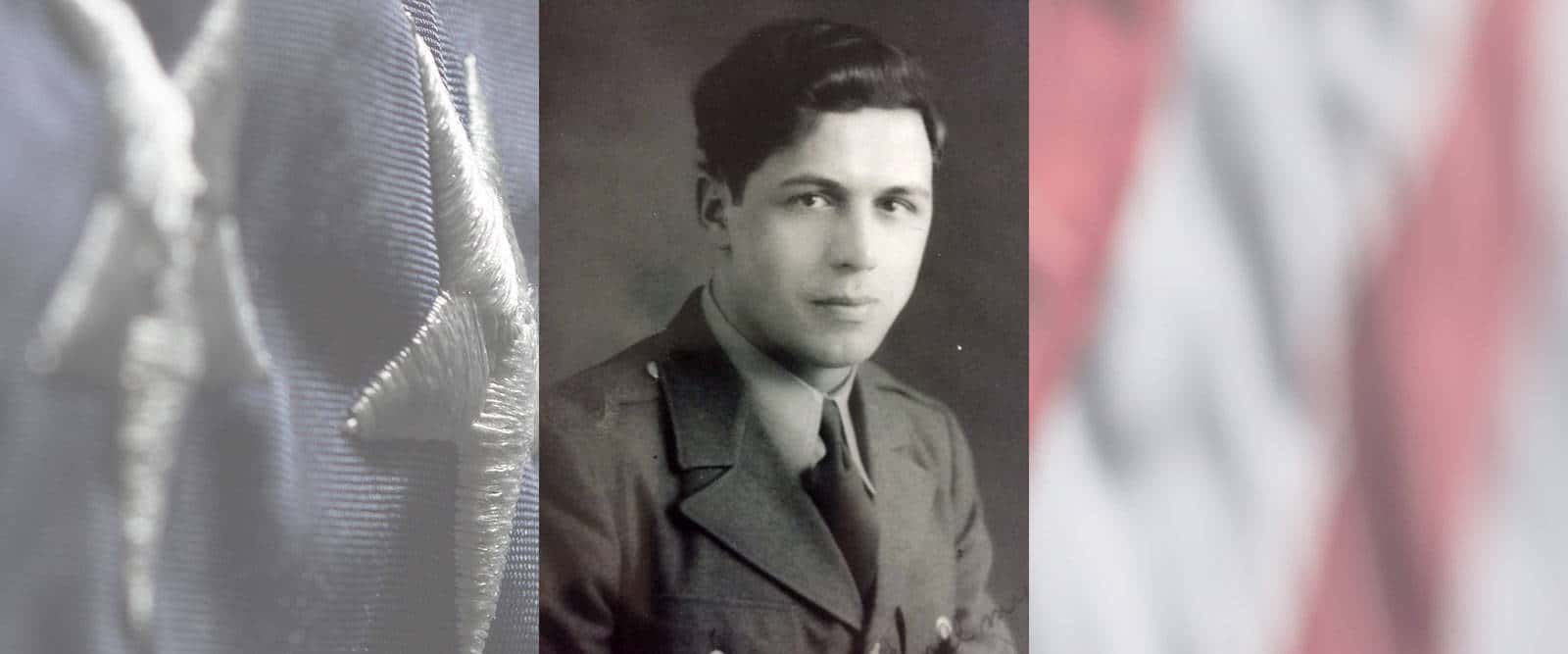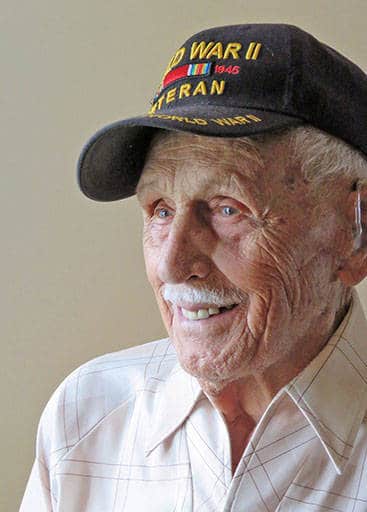U.S. Army World War II Roselle, IL Flight date: 09/13/17
By Carla Khan, Honor Flight Chicago Veteran Interviews Volunteer
“Death, destruction, and total devastation” is how 98-year-old WWII Veteran Jerry Juliano describes his impression of landing on Omaha Beach, June 6th, 1944. The scene exceeded his worst imagination even though Jerry’s basic training as well as the 4 months waiting period in England had been geared towards this important morning.
As a teenager, Jerry had been a go-getter with a tremendous sense of responsibility. His dad had died unexpectedly, leaving behind Jerry’s mother, 13-year-old Jerry and his four sisters. He suddenly had become the man of the house and sole provider. He had barely finished grammar school when he got a shoe shine kit and proceeded to shine shoes at Chicago’s World Fair of Progress in 1933. Once that ended, the now 15-year-old Jerry signed up to participate in the Civilian Conservation Corps and was sent to Oregon State. There he built picnic benches for six months, then returned home to work as an apprentice cabinet maker. He also applied for the government program to work for food stamps because, “you had to work to get something, nothing was a free hand-out” and Jerry, after all, felt responsible for his mother and his sisters. He also had gotten a job as a runner at Midway, taking timesheets to and from the construction workers out on the field. He joined the National Guard and eventually was drafted into the US Army on June 5th, 1942.
June 5th became a memorable day because it also was the day he married Evangeline, the love of his life. The draft notice weighed heavy on his heart because he knew he’d have to go to war but did not yet want to tell his bride and spoil her wedding day. Soon, he was sent to boot camp in Mississippi where along with many others, he was trained as an infantry rifleman destined to fill “vacancies” incurred during the battles in Europe. They shipped out of New Jersey and headed for England where they stayed for almost four months, all the while training as rumors of an impending invasion did their rounds. Quarters were tight and meals were served only twice a day because of the many men who had to be served. The food, according to Jerry was great because “if you are 25 and you only eat twice a day, all food tastes great.” He remained optimistic and undaunted. Days were spent doing physical training and everyone was a friend “because we all knew that our future was very uncertain.” On the bright side, there were the British girls who were all too willing to meet up with American Servicemen.
Finally, on June 2nd, 1944 initial D-Day activities began. The soldiers boarded their vessels but the weather conditions in the English Channel were so poor that the ships were put on hold for four more days till the word “Go” was given early in the morning of June 6th, 1944. Near the landing site, the soldiers had to climb over the side of the ship into a net and down into their landing craft. Heavy shelling was all around them; it was a cold, wet and surreal experience. Finally, Jerry’s platoon hit Omaha Beach where all life had ceased. Death was all around and corpses of fallen soldiers and carcasses of killed animals were strewn about. Under leadership of their Sergeant, this new platoon of soldiers slowly but surely battled its way forward. They cleared the beach and moved forward, often hiding in their foxholes. This continued until they reached the small town of Sainte Mère-Eglise. While searching farm buildings Jerry, being of Italian descent, was familiar with 40 Gallon wine vessels. Much to his pleasant surprise, he discovered that the French farmers stored their cider and wine in enormous 100 Gallon vessels – and they were still filled! It undoubtedly was his highlight of WWII!
Unfortunately for Jerry, an enemy shell exploded so close to him that it blew a hole in his ear drum. He only remembers that the medics collected him and sent him back to England where he spent a month in a hospital. Because he had completely lost his hearing in his right ear, he was declared unfit for battle and went back to his barrack for convalescence. However, since everyone who was able bodied was sent to the front, there was enough work to be done for Jerry and he was put in charge of German POW’s (who turned out to be Russians) to unload supplies from railcars onto trucks. This way, everyone still contributed to the war effort. During this time Jerry also had the opportunity to visit bomb ravaged London and he learned that the Britishers had been very short of food and often relied on the GI’s to give them canned fruit.
At last, the time came for Jerry to be sent home and finally meet his 18-month son. Although he and Evangeline had been in touch via mail, they had become accustomed to their own life styles and, while they still loved each other, had become estranged. Evangeline, a nurse, shared a house with another nurse and had a system where they each watched each other’s babies. Jerry, who had experienced death and destruction during the war, was not accustomed to having a toddler around. It took a lot of love, understanding, and compassion from both sides to make their marriage work again but they did – and were happily married for 68 years!
Post-war, Jerry continued to be an entrepreneur. He bought a truck, teamed up with a friend and they had their own construction business. Next, Jerry moved on to owning laundromats, and eventually started a real estate business in which his sons are now partners. Instead of quietly retiring in Florida, Jerry saw other real estate opportunities in which he is still involved along with his sons. Jerry’s need and desire to work for his family at an early age has continued through the years. This hard-working American son of immigrants fought for his country and then lived the American Dream.
Jerry, Welcome Home! Thank You for your Service. Enjoy your well-deserved Honor Flight.




